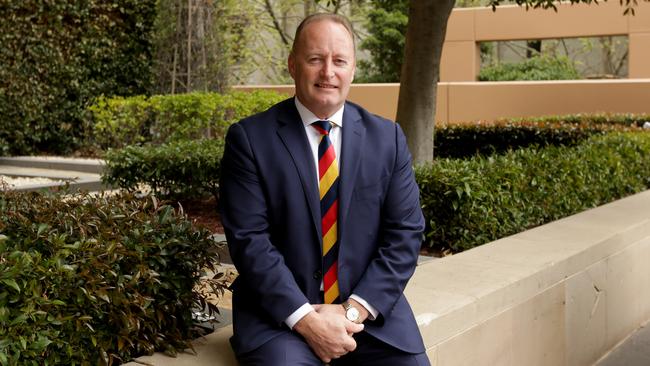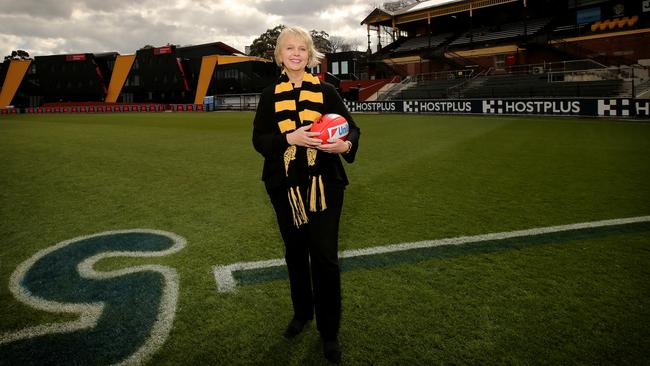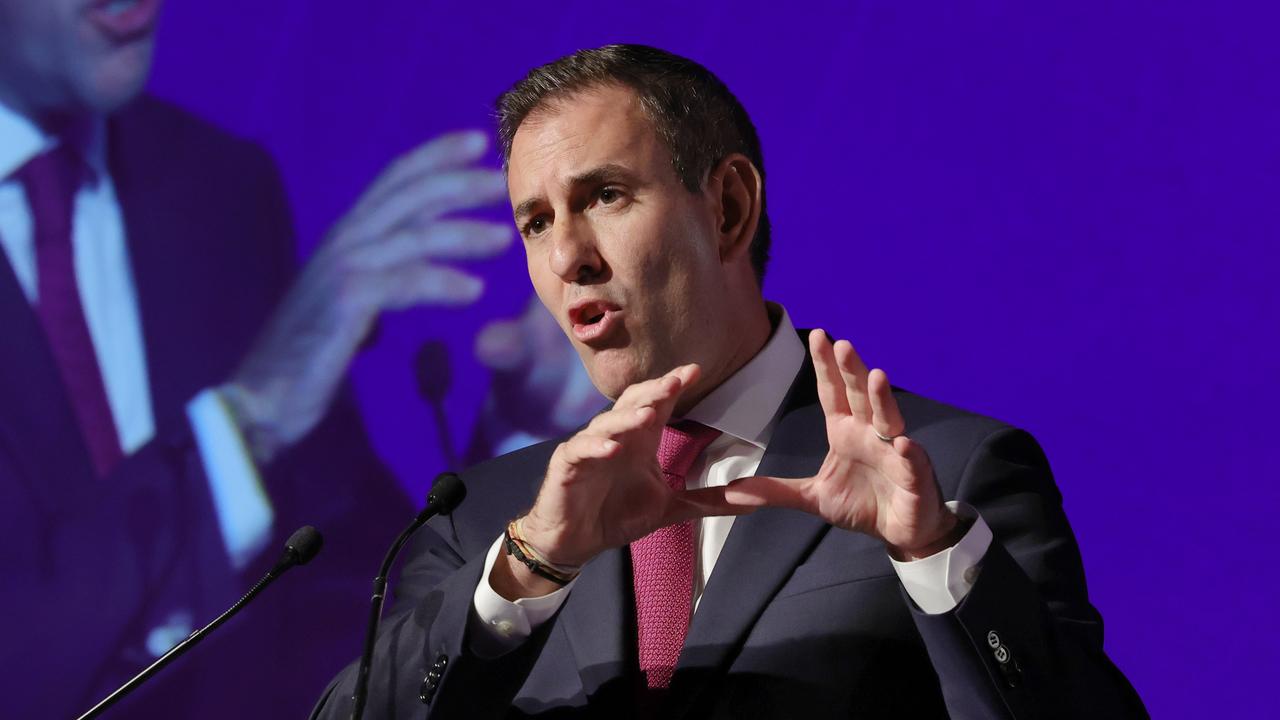Adelaide Crows chairman Rob Chapman: execute well and win
Adelaide Crows chairman and ex-Westpac banker Rob Chapman values a message this week from former boss Gail Kelly.

Of all the backslappers, well-wishers in desperate need of grand final tickets, and simple expressions of goodwill, Adelaide Crows chairman and former Westpac banker Rob Chapman has been touched by a few gestures this week, including a text message from his former boss Gail Kelly.
Chapman’s phone lit up when Kelly got in touch to wish him luck and congratulate the Crows on coming this far.
“I loved working for Gail, both at St George and then at Westpac, and I resisted to the extent that I could before I did go and run St George, Bank of Melbourne and BankSA in Sydney for a couple of years,” he says.
“She’s an exceptional communicator and I trusted her and she trusted me, which is a good foundation for a strong working relationship.
“Anyway, I texted her back and said: ‘Well, you know what it’s like in sport. It’s one thing to make the grand final. Now we have to execute well and win it.”
Chapman — or “Chappie”, as he was known at Westpac — acknowledges it’s never been easy to extract him from his home town of Adelaide.
Three times he uprooted his family to work on the east coast, only to return on each occasion to the city where he grew up and played “very amateur” football.
“Just tell everyone I was a ball magnet!” he jokes.
It was in Adelaide, too, that Chapman secured his first senior position as general manager of South Australia and the Northern Territory for giant British insurer Prudential.
In 1998, only weeks after Peter Smedley’s Colonial juggernaut announced the acquisition of the insurer’s Australian and New Zealand businesses, he celebrated back-to-back premierships for the Crows in the Prudential corporate box at the MCG.
Two years later, Chapman met Kelly — then at Commonwealth Bank — when CBA splashed $10 billion on Colonial.
It was a meeting that would determine the next decade or more of his professional life.
The duo worked together when she was appointed St George Bank chief executive, and Chapman became a senior Westpac executive in late 2008 after Kelly took the top job at the major bank and promptly paid $15bn for her old shop.
St George eventually fired up for Westpac, but there was a 12 to 18-month period until late 2012 when Kelly’s confidence was shaken and the market turned on her. It was during that period, in March 2012, that Kelly reshuffled her senior management for the second time in four months, leading Chapman to quit the St George CEO role and return to Adelaide.
Thankfully, football administration had already entered his life.
In December 2008, just as the financial crisis was peaking and Chapman had become BankSA chief executive, the Crows elevated him to president.
Looking back now, he says: “Mate, when you chair a footy club and you’re running a bank in a financial crisis, you can offend someone every day!”
Throughout history on grand final morning, the overwhelming consensus is that a contest for the ages is looming — the two best teams locked in mortal combat, the two best teams intent on atonement for past calamities, the two best teams reduced to one.
This year, however, there will be triumph and pathos aplenty, regardless of the result.
After the Western Bulldogs delivered the impossible dream in 2016, overcoming the Sydney Swans to secure the club’s first flag in 62 years, there’s an unmistakeable vibe in Melbourne that it’s the Tigers’ turn.
The Tigers are a living paradox — the power club of the 1970s and 80s that lost its roar; their loyal supporters frozen in melancholy acceptance that it’s their lot to live on past glories.
The club’s last flag was in 1980, and the last time before this year they won a finals game was in 2001. Yet in 2017, they have mobilised the vast Tiger army by winning both their finals.
The team is lined with elite talent — the incomparable midfielder Dustin Martin, a cult figure who won this year’s Brownlow Medal and donates his skin to experimental tattooists, the competition’s best backman Alex Rance, one of its premier forwards Jack Riewoldt, and the team’s captain and inspiration Trent Cotchin.
Oh, and the club president, commercial lawyer Peggy O’Neal, has not only survived a couple of attempted boardroom coups, but led the move to reappoint coach Damien Hardwick.

After a poor 2016 season, most of the football world — and many of the club’s 75,000-strong membership — were ready for a mercy mission to cart Hardwick off to the failed coaches’ knackery.
So that’s the Tigers, but the confounding thing is that the Crows also have an extraordinary backstory, with trauma a recurring theme.
The glory years for the Crows came quickly — after joining the competition in 1991, they won flags in 1997 and 1998. Since then, it’s been lean pickings, coupled with a fair measure of tragedy.
In February 2012, club doctor Brian Sando lost his battle with pancreatic cancer, and cancer took the life of assistant coach Dean Bailey in March 2014.
Then, a week before this year’s finals series, the brother of Crows ruckman Sam Jacobs died from an undisclosed illness.
These three events alone would have been deeply unsettling, but it was the tragic death of senior coach Phil Walsh at the hand of his son in July 2015 that brought home to a group of young men how fleeting life can be.
Chapman got a 3.30am call from Adelaide police telling him that Walsh had died.
At the time he said it was the kind of phone call that “no one ever wants to get”.
While Chapman says he has met a lot of inspirational leaders in business and sport, he tells The Weekend Australian that Walsh had more impact in his 10 months at the Crows than anyone could have anticipated.
“If you have to go through an experience (like Walsh’s death) as a young person, being in a footy club environment is where you’d want to be — we support them with welfare and there’s lots of people who’ll wrap their arms around you,” Chapman says.
“But the players have learned things that most people wouldn’t have had to experience.
“I’m not going to say it’s why we’re resilient and tenacious and joined together, but it’s got to have an impact and it’s in the forefront of everyone’s minds.”
Chapman agrees it’s important to find the right balance between respect for the past and keeping an eye on the future. From business experience, he says the playbook for a new boss is often the recruitment of trusted “confidants” to replace incumbent management.
Walsh’s replacement, current coach Don Pyke, resisted that option, choosing to build on the foundations established by his predecessor.
“That took a bit of courage,” Chapman says.
“We’ve been incredibly lucky, or as I prefer to say we did our due diligence extremely well, to select Phil and Don as our coaches.
“Don has built on Phil’s legacy and added his own strategies. So make no mistake: this is very much Don Pyke’s team.”
Unlike the Tigers, the talent gods haven’t smiled so generously at the Crows.
When the team knocked off Greater Western Sydney in a qualifying final a few weeks ago, Chapman joked to his Giants counterpart Tony Shepherd that GWS was stacked with 20 top-20 draft picks compared with the Crows’ two.
It’s a stunning comparison that Chapman stresses is not to diminish the Giants’ achievements. On the contrary, he says they’re a “powerhouse” of the future.
It’s just that the onus is always on the Crows to gel as a team rather than rely — at least sometimes — on individual flair and talent.
While the club has had to absorb the loss of elite talent, notably the transfer of midfielder Patrick Dangerfield to Geelong, it’s compensated by trading well and bringing in the likes of Jacobs, forwards Tom Lynch and Josh Jenkins, and goalsneak Eddie Betts.
“What we’ve done to get here is play a team game, with everyone playing their designated role, contesting the footy, tackling and hardball gets,” Chapman says.
“They roll off the tongue pretty easily but if you win in those areas you’ll win the grand final.”
Chapman is not a suspicious man — he doesn’t have a lucky pair of socks.
“I’m a banker!” he protests.
As a spectator, he says he’s normally pretty calm and relaxed, although this week he confesses to being “as nervous as hell”.
Victory, of course, would be a marvellous antidote. “That would be the pinnacle — if my coach and captain are holding up the trophy (this afternoon), I’ll be the proudest person in a crowd of 100,000.”



To join the conversation, please log in. Don't have an account? Register
Join the conversation, you are commenting as Logout